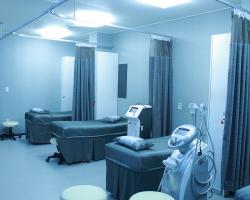The counteraction of abuse towards the patients of psychiatric hospitals and assurance of the realisation of the rights of such patients are the main objectives of the psychiatric hospital patient rights commissioners.
The institution of the Commissioner for Patients' Rights was established in 2006 by an amendment to the act on mental health care.
Until 2009, the commissioners were employed by the Bureau at the Ministry of Health, and since 2009, they have become the employees of the Patients' Rights Office after its establishment.
In 2012, this function was held by 37 individuals in 71 psychiatric hospitals and wards in 15 voivodeships. According to the information of the Bureau, the commissioners examined approximately 13 thousand cases in 2013.
The purpose of their establishment
The psychiatric hospital patient rights commissioners were established to ensure the rights of people taking advantage of the health benefits offered by psychiatric hospitals. The commissioners also counteract abuse toward patients.
The objectives of psychiatric hospital patient rights commissioners include the following:
- assistance in pursuing rights in cases associated with admission, treatment, conditions, and checking out of psychiatric hospitals,
- explanation or assistance in the explanation of the verbal and written complaints of the patients,
- cooperation with the family, statutory representative, legal or actual guardian of said patients,
- initiation and execution of educational and informational activity in the scope of individuals taking advantage of the health benefits provided by psychiatric hospitals.
A commissioner accepts verbal and written patient complaints, his family, his representative, or individual providing actual care, and assesses the strength of such complaints.
The commissioer must also provide the patient with access to legal information, assistance in the preparation and submission of the complaint to the hospital manager or other institutions, and assist a patient dismissed from a hospital, if a complaint should be filed during the said patient’s hospitalisation and has not been examined yet.
A commissioner should come out with the initiative of evaluating patient rights obedience, particularly those of patients admitted to psychiatric hospitals without consent, who are subject to direct force. This also concerns the patients incapable of providing consent or attitude to the admission or treatment and those staying in the hospitals under the power of a court ruling on the application of a precautionary measure.
The powers of the commissioners
A commissioner has the authority to submit a motion to the attending physician, the head of the psychiatric ward, or the manager of the health care establishment for the initiation of action aimed to remove the cause of the complaint. The commissioner may also submit the case to the entities, which established the facility.
“The commissioners have great influence on the improvement of the protection of the rights of individuals taking advantage of the health care provided in psychiatric hospitals and wards," assesses Krystyna Barbara Kozłowska, the Commissioner for Patients' Rights.
With the agreement of the patient, the commissioner may access the patient’s medical documentation.
The commissioners must be easily accessible, i.e. they should dedicate plenty of time to regular visits of the wards, be recognisable and trustworthy; they should also act independently of the hospital directors.
The objectives of the commissioners also include informational and educational activities, e.g. organisation of meetings with patients dedicated to their rights.









Comments (0)